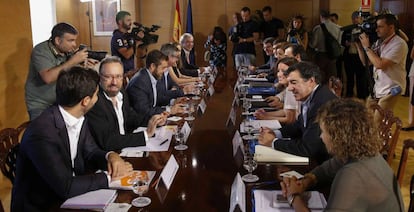Upcoming corruption trials to hamper PM’s bid to form government
Media spotlight will be on several senior figures from Mariano Rajoy’s Popular Party

As if Spain’s interim Prime Minister Mariano Rajoy didn’t have enough on his plate trying to rally votes for an investiture vote in Congress next week he looks set to lose – which may mean a second bid in October – the upcoming trials of several senior figures in his Popular Party (PP) will further weaken his position in talks with other parties to form a government.
Socialist Party (PSOE) leader Pedro Sánchez has cited the many corruption cases involving the PP as one of the reasons he won’t be supporting Rajoy at the investiture debate beginning on August 30.
Similarly, Albert Rivera, leader of the emerging center-right Ciudadanos party, has obliged the PP to sign an anti-corruption pact before sitting down to talks on supporting Rajoy’s bid to form a government and end an eight-month political stalemate that has produced two inconclusive elections and that might well continue until a third poll, which has been provisionally slated for December 25.
This autumn will also produce trials relating to corruption in the PP’s Madrid division, the Agriculture Ministry, as well as graft accusations against three former PP deputies
Should Rajoy fail to garner the support he needs in Congress later this month, he may try again in October, after two key regional elections in September. The problem is that by then, the Spanish media will be focused on a series of high-profile trials of senior PP figures.
On October 4, the so-called Gürtel case finally goes to trial, and is expected to last until mid-December. This relates to a kickbacks-for-contracts scheme that extended widely within the PP and that has become the biggest known case of party-related corruption in Spain’s democratic history.
The defendants, who include a former party treasurer and an ex-minister, are formal suspects of 12 offenses allegedly committed between 1999 and 2005. Five former secretary generals will be called as witnesses.
This autumn will also see former PP treasurer Luis Barcenas stand trial for his involvement in off-the-books cash payments allegedly made over two decades to senior PP figures from donations to the party. At the same time, the anti-corruption pact with Ciudadanos requires Congress to set up a cross-party commission to look into allegations of illegal financing in the PP.
Then there is the question of what to do with the former mayor of Valencia, Rita Barberá, who has not been arrested or placed under official investigation, but in various surveillance recordings turned over by a former top PP official suspected is seemingly referred to by co-conspirators as “the lady boss” and was fully aware of the alleged kickback schemes in Valencia City Hall over many years.
Socialist Party (PSOE) leader Pedro Sánchez has cited the many corruption cases involving the PP as one of the reasons he won’t be supporting Rajoy at the investiture debate
Barberá, now a member of the Senate, enjoys immunity from prosecution, which can only be lifted by the Supreme Court at the request of a regional court in Valencia. The anti-corruption pact with Ciudadanos requires the PP to expel anybody accused of corruption.
This autumn will also produce trials relating to corruption in the PP’s Madrid division, the Agriculture Ministry, as well as graft accusations against three former PP deputies.
On September 23, former deputy prime minister and head of the IMF Rodrigo Rato faces trial over the so-called “black credit cards” issued to 85 executives and members of the board of the Caja Madrid savings bank and its successor Bankia between 1999 and 2012. Rato was in charge of the bank between 2010 and 2012.
Bank officials racked up a collective €15.2 million in personal expenses that were paid for by the bank, although the money did not show up as earnings on their income tax filings.
English version by Nick Lyne.
Tu suscripción se está usando en otro dispositivo
¿Quieres añadir otro usuario a tu suscripción?
Si continúas leyendo en este dispositivo, no se podrá leer en el otro.
FlechaTu suscripción se está usando en otro dispositivo y solo puedes acceder a EL PAÍS desde un dispositivo a la vez.
Si quieres compartir tu cuenta, cambia tu suscripción a la modalidad Premium, así podrás añadir otro usuario. Cada uno accederá con su propia cuenta de email, lo que os permitirá personalizar vuestra experiencia en EL PAÍS.
¿Tienes una suscripción de empresa? Accede aquí para contratar más cuentas.
En el caso de no saber quién está usando tu cuenta, te recomendamos cambiar tu contraseña aquí.
Si decides continuar compartiendo tu cuenta, este mensaje se mostrará en tu dispositivo y en el de la otra persona que está usando tu cuenta de forma indefinida, afectando a tu experiencia de lectura. Puedes consultar aquí los términos y condiciones de la suscripción digital.








































